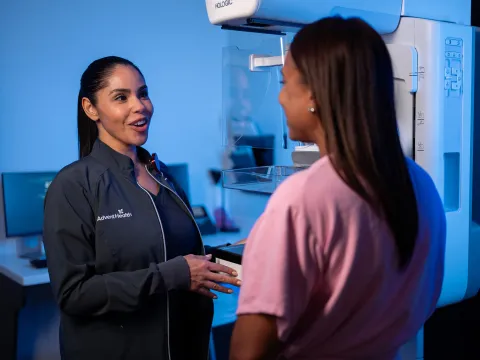- AdventHealth

Your heart is a truly amazing muscle with an intricate electrical system that controls every heartbeat, as well as your heart’s rhythm and rate. Normally, an electrical signal travels through the heart muscle from top to bottom, making it pump blood to your body.
Sometimes, the electrical signal doesn’t form properly or fails to travel through the heart the right way (or both). As a result, the heart beats abnormally — too quickly, too slowly, at the wrong pace or in a poorly coordinated way between the upper and lower chambers.
It's Safe to Get Tests for Your Heart in Person
We know these times of uncertainty are difficult to navigate, but we want to assure you that we’re taking extra safety measures at all AdventHealth facilities. You don’t need to delay in-person care for your heart any longer. We’re ready when you’re ready.
An Irregular Heartbeat May Be Putting You at Risk
An irregular heartbeat can leave you short of breath, lightheaded and worried. Different conditions, including heart disease, heart attack or your genetic makeup, can cause an irregular heartbeat. Some conditions produce no problems, but others may put you at risk of having sudden cardiac arrest or stroke.
Electrophysiology Tests Help You Understand Your Irregular Heartbeats
The sooner we find out why your heartbeat is abnormal, the sooner we can take steps to strengthen your cardiovascular health. Electrophysiology tests help doctors determine the cause of an irregular heartbeat and whether you need further treatment. The test allows your physician to evaluate the electrical activity in your heart to see whether there is a signaling problem.
To perform the test, your physician will insert a specialized catheter into a blood vessel in your groin area or arm and advance it into your heart while you are under anesthesia. The catheter sends electrical signals to your heart and the activity is recorded.
We’re Taking Extra Safety Measures for In-Person Appointments
We understand why you might have delayed having an electrophysiology test recently. You can come in for your appointment with confidence as we’re taking extra safety measures to protect everyone — you, other patients and visitors and our health care team members.
Everyone Must Wear a Face Mask
The CDC recommends that everyone should wear a face mask in public settings. All patients and visitors to AdventHealth locations must wear one to help prevent the spread of infectious disease.
It’s OK if you don’t have a cloth mask. We can provide you with one before you enter our facility. Our health care team members are wearing gloves, masks and other personal protective equipment (PPE). We have supplies on hand to meet their needs, too.
Temperature Checks at All Entrances
Everyone visiting an AdventHealth facility must pass a temperature check, just like all of our team members do. This is because a high temperature usually indicates a fever, which is one of the main symptoms of illness.
Separate Care Areas for People Who Are Sick
People who have a fever are separated from other visitors immediately and cared for in a separate area. This practice, called patient cohorting, empowers us to keep you protected and safe during your visit.
Social Distancing Measures in Waiting Areas
We know how important it is to maintain social distancing in times like these. That’s why we have new rules in place to help everyone stay safely apart from one another. Check-in desks have clear, protective shields to protect you and our registration staff. Fewer people are allowed in waiting rooms at one time, as well. We have placed signs on some of the chairs to indicate they aren’t to be used and to thank you for helping everyone stay a safe distance apart.
At some of our locations, you can even choose to wait in your car and have us send you a text message to notify you when it’s your appointment time
Here to Care for All Your Heart Needs, Safely
At AdventHealth, our heart and vascular care team are experts in treating heart conduction disorders, including atrial fibrillation and arrhythmias. Some conditions can be managed successfully with monitoring and medications, but others may require a pacemaker, a device to halt atrial fibrillation, or surgery to correct a structural defect. No matter your test results, you can trust that we will care for you every step of the way.
We’re Ready When You’re Ready
Get in touch with our heart and vascular care team to schedule your electrophysiology test today. As a first step, you can reach out in a telemedicine call to discuss your health and any concerns with your physician. Because when it comes to your heart, we’ve got you covered. Nothing matters more to us than you.




